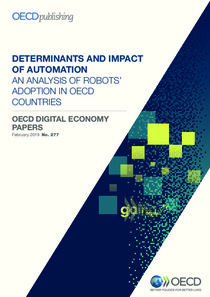Determinants and impact of automation. An analysis of robots' adoption in OECD countries

Organisation for Economic Co-operation and Development, Paris
OECD Publishing - Paris
2019
35 p.
automation ; robots ; industrial sector ; employment
OECD Digital Economy Papers
277
Technology
https://doi.org/10.1787/ef425cb0-en
English
Bibliogr.
"This report analyses automation trends and its effect on employment in OECD countries. On average, robots are found to be associated with a reduction in employment in elementary occupations – those requiring the lowest levels of skills – and an increase in employment in high-skill occupation such as professionals and technicians. For occupations in the middle of the skills distribution the correlation is strong and negative. In general, therefore, these estimates do not support the hypothesis of labour market polarisation, i.e.: an increase in both high-skill and low-skill employment. However, in a few countries - notably the United States - this report finds evidence of labour market polarisation."
Digital
The ETUI is co-funded by the European Union. Views and opinions expressed are however those of the author(s) only and do not necessarily reflect those of the European Union or the ETUI.